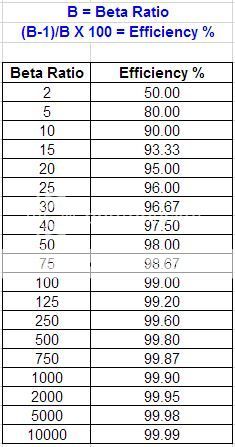Originally Posted By: Trav
Yet becuse of a conversation with someone at Wix probably reading from a sheet it gets derided on BITOG as a less than high quality filter.
You really don't believe WIX's own specs and think the XP is more efficient than the maker of the filter claims? That's pretty funny actually - a symptom of fanboyism perhaps? There have been many guys on this board that have called WIX about it. Like I said, if it was a "typo" then WIX would have said so and corrected it by now. But even after people have asked them about it for a year they still hold fast to their 50% @ 20 microns. IMO, WIX is paranoid to make a long OCI filter that is efficient for fear it will load up and cause oil starvation like Amsoil had a while back with one of their filer lines. Only 1 out of 1000 people even know what a micron is and how it is associated with a filter's efficiency, so manufactures can safely stay nebulous about the real efficiency (like Purolator is now doing too) because they know the majority will take their word that it's a "great filter".
Originally Posted By: Trav
Someone posted a UOA from an engine running the XP that was just as good as those with the Fram or any other, if its so bad why aren't the wear metals elevated?
If rocks are going through the filter surely the bearings must be scored to blazes.
I don't think UOAs give much insight to how well oil filters perform - that is what a test like ISO 4548-12 is for. If there was major wear, it's possible the filter has caught most of those particles and therefore they never show up in the UOA.
Originally Posted By: Trav
How large a particle is considered detrimental? Before answering take the size of a micron, the bearing clearance and oil film thickness into account.
If you do some research, there are many technical papers about wear vs particle size that say particles that are 25 microns and less do the most wear damage.
Yet becuse of a conversation with someone at Wix probably reading from a sheet it gets derided on BITOG as a less than high quality filter.
You really don't believe WIX's own specs and think the XP is more efficient than the maker of the filter claims? That's pretty funny actually - a symptom of fanboyism perhaps? There have been many guys on this board that have called WIX about it. Like I said, if it was a "typo" then WIX would have said so and corrected it by now. But even after people have asked them about it for a year they still hold fast to their 50% @ 20 microns. IMO, WIX is paranoid to make a long OCI filter that is efficient for fear it will load up and cause oil starvation like Amsoil had a while back with one of their filer lines. Only 1 out of 1000 people even know what a micron is and how it is associated with a filter's efficiency, so manufactures can safely stay nebulous about the real efficiency (like Purolator is now doing too) because they know the majority will take their word that it's a "great filter".
Originally Posted By: Trav
Someone posted a UOA from an engine running the XP that was just as good as those with the Fram or any other, if its so bad why aren't the wear metals elevated?
If rocks are going through the filter surely the bearings must be scored to blazes.
I don't think UOAs give much insight to how well oil filters perform - that is what a test like ISO 4548-12 is for. If there was major wear, it's possible the filter has caught most of those particles and therefore they never show up in the UOA.
Originally Posted By: Trav
How large a particle is considered detrimental? Before answering take the size of a micron, the bearing clearance and oil film thickness into account.
If you do some research, there are many technical papers about wear vs particle size that say particles that are 25 microns and less do the most wear damage.




